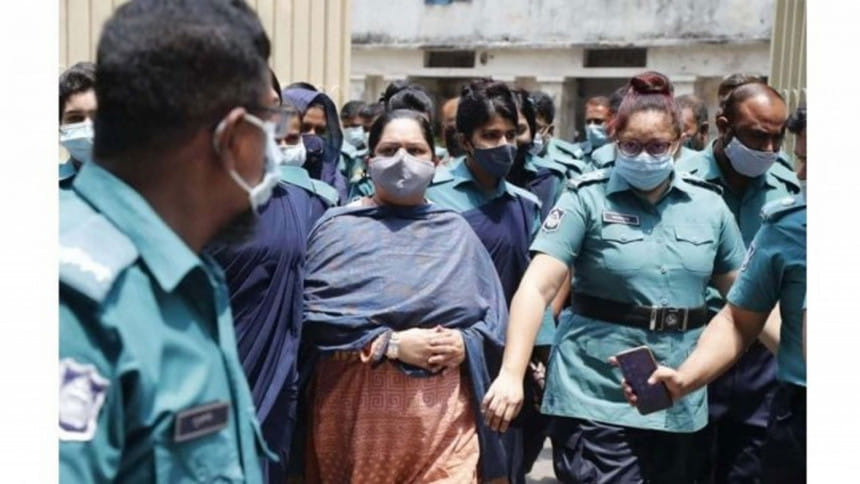News Analysis: Health ministry’s ad and freedom of press

It is not often that the government spends public money (does it have the right to do so?) to vilify a senior journalist who has established her credentials as a bold, effective and highly competent investigative journalist. It is mainly due to her work that many corruption cases stand revealed. All stories are solidly sourced and based on official documents, letters of complaint by responsible officials and findings by officially constituted bodies. These reports show that conscientious officials were informing higher officials about huge corruption and demanding action.
It is not surprising that nothing much has happened in terms of investigating those corruption that involved hundreds of crores of taka. And again it is not surprising that instead of the corrupt, the journalist who revealed the corruption stands accused today and is in jail who, we hope, will get bail today.
The health ministry in an advertisement, published yesterday, in this paper and many others, tried to prove that Rozina Islam had wrongfully entered the office of the Private Secretary (PS) to the health secretary, took photographs of some official documents by her mobile phone and also tried to "steal" some documents.
For this alleged action, Rozina was confined to the PS's office for nearly six hours -- from 3:00pm to 8:30 pm (approximately) -- and harassed physically and mentally during this period. She had to suffer verbal abuse and humiliating utterances made by staffs of various levels at the ministry.
On the basis of information provided in the advertisement, several issues that need to be raised are extremely important for the future of journalism in Bangladesh.
1. Why was Rozina Islam forcibly kept in the PS's room for such a long time against her will? This constitutes wrongful confinement which is a serious offence, a violation of the fundamental right of a citizen and punishable under law.
2. Under what authority was Rozina subjected to a body search? Body search can only be conducted by authorised personnel under proper observation and laid-down rules. From what we know, a junior woman staffer of the ministry conducted the body search, against her will, which was clearly a very humiliating experience for her as it will be for anybody who will have an unknown person physically invading her privacy. Anybody of a modicum of personal dignity will find such an experience revolting.
3. Video footage shown on television clearly shows that a woman was pinning Rozina down with her hand on the upper part of her chest, very close to her throat in a posture which appeared quite threatening.
4. The language used with her was most insulting. From the very beginning she was treated as somebody whose "crime" had been proven and as such treated like a criminal.
5. The health ministry's advertisement says "… এতে প্রতীয়মান হয় যে….. (this proves that she had stolen important state files." In the advertisement the health ministry calls her a "thief" without any proof which is totally defamatory.
6. The advertisement further says "… when Rozina suddenly laid herself on the ground, an attempt was made to sit her back on a chair". It is clear that the health ministry officials were so busy harassing her that they paid no heed to her deteriorating physical condition and repeated appeals for help. Why will Rozina suddenly lay herself on the ground? The reason was that she was feeling sick and she kept on asking for medical assistance which was not provided to her.
7. The advertisement also says "Mobile phone was taken from her and she provided the password". The question is under what authority was her mobile phone taken by a staffer of the health ministry? Only police can do so. A mobile phone is a personal item. It contains many things which are totally private. Taking a person's mobile phone without lawful authority constitutes invasion of privacy, which constitutes an offence.
Couldn't photos and copies of files be added after taking the phone away from Rozina is a question that has now been legitimately raised?
All the above questions were not answered in the said advertisement.
Instead, public money was spent in weaving a well-tailored story to vilify a highly respected journalist. Questions must also be raised regarding the three-member investigation committee set up by the health ministry which is supposed to unearth the truth. When health ministry has already gone public with an advertisement that clearly accuses Rozina of "theft", we can easily imagine how impartial the committee's findings would be and what "truth" it is likely to reveal? By publishing the advertisement, the ministry has turned the work of its own committee into a farce making it another instance of wasting public money.
Journalists have demanded that an enquiry committee be set up with neutral personnel and not with health ministry bureaucrats against whom most of Rozina's reports were made. There is obvious merit in this demand.
The law minister and various senior leaders of the ruling party have assured us that justice will be done. We want to see the beginning of it with bail for Rozina.
Post Script
Some questions have been raised as to why we published the health ministry's advertisement. Not publishing it would have constituted a form of censorship that we thoroughly reject. Since the said ministry has been the subject of many recent news reports, we feel that the public has the right to know what the health ministry's views are.

 For all latest news, follow The Daily Star's Google News channel.
For all latest news, follow The Daily Star's Google News channel. 




Comments